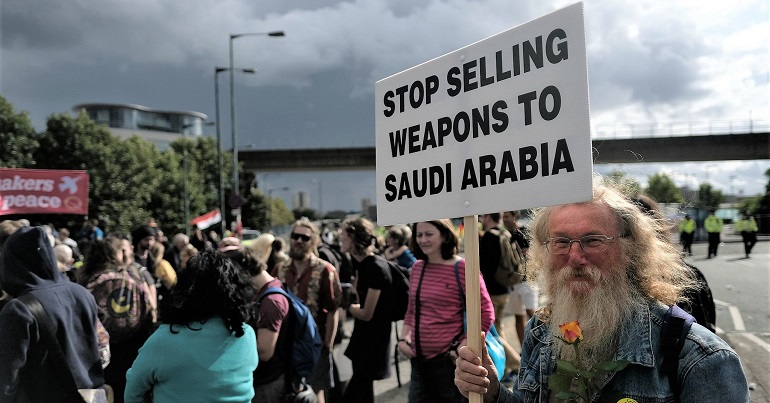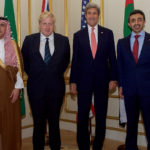From Afghanistan to Saudi Arabia – it’s time to end Britain’s lethal arms peddling

Politics has its cycles, not just elections, but events that come around again and again. But that doesn’t make it repetitive.
No event occurs twice in the same political environment, and that’s highlighted by the circumstances in which this year I again join protests against arms fairs, in Liverpool (today-Saturday) and London (tomorrow-Sunday).
This year’s fairs begin in the context of the collapse of the Western-backed regime in Afghanistan, where the Taliban has taken over not just the government, and the fate of 38 million people, but huge masses of Western-made and supplied arms.
More than £150m of UK-made arms were licensed for export to Afghanistan from 2008, the vast majority of which we can assume were delivered. That’s in addition to the 2,000 US-made armoured vehicles, 40 military aircraft including Black Hawk helicopters, and uncertain number of high-tech military drones now thought to be in Taliban hands, as well as enormous quantities of more “mundane” arms, from night-vision goggles to 600,000 infantry weapons including M16 assault rifles, – $28 billion-worth in total.
No doubt some of these at the high-tech end will be little more than trophies without technical support, but most of them will be usable, and used, in Afghanistan, or elsewhere.
The argument that shipping masses more weapons out into a world awash with them can be driven home with new power. That our security is endangered by those weapons is now blindingly, horrifyingly, obvious.
It’s a reminder that while governments like to give the impression that the only problem with arms sales is a small number of dodgy, clandestine deals. In fact, the vast majority of arms sales into human rights-abusing regimes are not only legal, but actively promoted by government, particularly our own.
Between 2011-2020, the UK licensed £16.8 billion in arms sales to countries classified as “not free” because of their human rights records.
At the top of the roll of dishonour is arms sales to Saudi Arabia, one of the world’s worst human rights-abusing regimes, and proponent of a brutal bombing campaign in Yemen that has killed more than 8,000 civilians and is a major driver in a humanitarian crisis of gut-wrenching proportions.
Since the bombing began the published value of UK arms export licences is £6.8 billion. Sales through the opaque open licence system undoubtedly boost that figure enormously – the Campaign Against the Arms Trade estimates to at least £18 billion.
The Saudi regime will fall. Such regimes always fall – as the Shah of Iran, Colonel Gaddafi and Saddam Hussein in Iraq – all figures we at times armed, and in the majority of cases then toppled, with highly unstable results.
The other chief change in the international climate around these fairs is the climate – the now awfully, tragically evident emergency condition of our natural systems, action against which the UK has a unique responsibility as the chair of the COP26 talks.
That’s something acknowledged in the Integrated Review of Security, Defence, Development and Policy published earlier this year. Much of that is now obsolete, in a world in which it is blindingly clear that President Biden’s foreign policy is less different from that of President Trump than many expected, at least in its “America First” tendencies. But what remains achingly, obviously relevant is the urgency of the statement that “Her Majesty’s Government will make tackling climate change and biodiversity loss its number one international priority”.
That’s completely incompatible with continuing to be one of the world’s leading arms pushers. As the Early Day Motion originated by Green MP Caroline Lucas says, there is an “inherent conflict between the Government’s promotion of military exports and both its stated desire to help protect human rights overseas and the climate emergency demanding unprecedented international co-operation as a global priority”. That only 10 MPs have now signed this is a disgrace – please ask your MP to sign.
The two issues are linked not just because endangering security by shipping further weapons out into a world awash with them prevents states from taking climate action. Or because government money going into supporting the arms trade could be going into essential climate action – particularly in the Global South, to programmes hard hit by the government’s breaking of its election international development assistance promise.
But also because of the human resources taken up in the production of weapons – including the hideous, unusable weapons of mass destruction that are nuclear weapons – that could and should be going into developing and producing the technologies and tools we need to tackle the climate emergency and nature crisis.
Traditionally many – including the Labour Party – have defended the arms industry on the basis of the provision of jobs. That never added up – but now looks even more indefensible, and outdated.
We are seeing labour shortages, and skills shortages, right across the UK economy, particularly in engineering. We can’t afford skilled, capable people, from engineers to machinists to lorry drivers, being employed in industries we don’t need – that are actively damaging to our security, our future. They need to be redeployed to the urgent issues of today.
This is updated swords into ploughshares: torpedoes to tidal turbines, rifles to renewables, submarines to solar.
PS. We hope you enjoyed this article. Bright Green has got big plans for the future to publish many more articles like this. You can help make that happen. Please donate to Bright Green now.
Image credit: Alisdaire Hickson – Creative Commons
Editor’s note – This article initially stated that £150 billion of UK made arms were licensed licensed for export to Afghanistan from 2008. It has been amended at 13:38, 11 September 2021 to state the correct figure, which is £150 million.



Leave a Reply